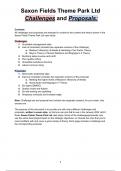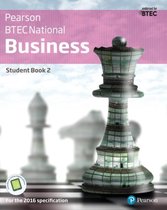Saxon Fields Theme Park Ltd
Challenges and Proposals:
Contents:
All challenges and proposals are analysed in context to the content and theory shown in the
Saxon Fields Theme Park Ltd case study.
Challenges:
1. Unsuitable management style
2. Lack of motivation (includes two separate versions of the challenge)
a. Maslow’s Hierarchy of Needs & Herzberg’s Two Factor Theory
b. Mayo’s Theory of Human Relations and Mcgregor’s X Theory
3. Declining sales revenue and profit
4. Poor quality culture
5. Unsuitable workforce structure
6. Labour turnover rising
Proposals:
1. Democratic leadership style
2. Improve motivation (includes two separate versions of the proposal)
a. Meeting the higher levels of Maslow’s Hierarchy of Needs
b. Social factor and Mcgregor’s Y Theory
3. Six sigma (DMAIC)
4. Quality circles and Kaizen
5. On-site training and upskilling
6. Temporary contracts and increase wage
Note: Challenge two and proposal two includes two separate versions, for your exam, only
choose one.
The purpose of this document is to provide you with many different challenges and
proposals, written in exam style, so that you can pick 3-4 to use in the January 2024 Unit 6
Exam Saxon Fields Theme Park Ltd case study. Some of the challenges/proposals may
use the same theory/logic/impact on the strategic objectives, so choose the ones that you’re
most confident with and cover a good variety of theory. Each page includes a challenge and
the corresponding proposal.
1
, Unsuitable management style:
One of the challenges that Saxon Fields Theme Parks Ltd faces is an unsuitable
management style causing severe issues for the business. The managing director, Nina,
clearly has an Autocratic management style because she often makes decisions without
consulting subordinates and shows characteristics of a micromanager, by following staff
around with a checklist, constantly scrutinising them. This puts her behaviour far left on the
leadership continuum, where she ‘tells’ others what to do, rather than inviting them to ‘join’
the decision making process. This style is unsuitable because of Nina’s inexperience, which
is a recipe for disaster. Although this style of management has the benefits of quick
decisions, due to Nina’s lack of experience, it has led to poor decisions such as; removing
low-cost accommodation, canteen subsidies, social activities and reducing the wages of
temporary staff. These decisions clearly go against the needs and wants of the staff, but as
under the Autocratic style there is no consultation of staff, their opinions were not
considered.
Furthermore, her micromanagement attitude overly scrutinises staff and due to her decision
have made them feel ‘over-stretched’. This could be the reason why labour turnover has
increased from 40% in 2018-19 to 67% in 2022-23, a 27% rise. High levels of labour
turnover negatively impact the increase profit objective because the business will need to
spend more on recruiting in order to fill the large amount of vacancies, therefore recruitment
costs rise and net profit declines.
Democratic leadership style:
To solve the challenge of an unsuitable management style, a Democratic leadership style
should be implemented. This style of leadership ensures that all staff are consulted, so that
their viewpoint is heard before making decisions. Referring back to the leadership continuum
for management behaviour, this pushes the behaviour further right where staff are invited to
‘join’ the decision making process. This not only makes staff feel more valued as they can
express their opinion, it also leads to higher quality decision making because staff are
interacting with visitors of the theme park on a day to day basis, they can offer viewpoints
and improvements that the management of Saxon Fields might not see.
A Democratic leadership style would have prevented the decline in employee satisfaction
and rise in labour turnover as the poor decisions like removing low-cost accommodation,
social activities, reducing pay etc, that Nina used her Autocratic power to implement would
not go through as from the meeting held by Steven and Sam, it is clear that the staff
opposed these changes. Although a drawback of the Democratic leadership style is slower
decision making, this is outweighed by the positive impact on the strategic objectives. As this
style will help reduce labour turnover, objective two, to increase customer satisfaction will
progress because shortages of staff and subsequent cafe/ride closure are avoided, providing
customers with a better experience. The Democratic style increases employee satisfaction
and reduces labour turnover by empowering staff. The objective to increase profit will
improve because staff will be more motivated, leading to lower recruitment costs and higher
levels of productivity.
2





